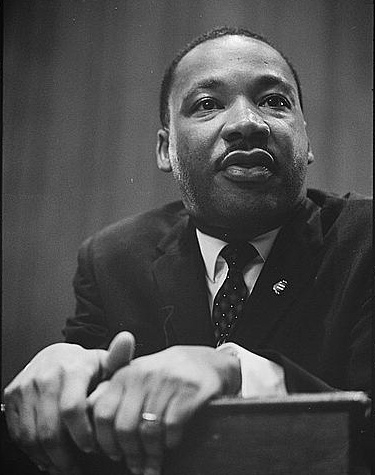
Divine providence brought me to Atlanta, Georgia today, April 4, 2018, exactly 50 years after the assassination of Dr. Martin Luther King, Jr. in Memphis, Tennessee. Dr. King was born, raised and buried in Atlanta, although he became a civil rights activist in Montgomery, Alabama. I read his book, Stride Toward Freedom: The Montgomery Story, in preparation for this trip. It describes the formation and application of his nonviolent resistance philosophy in the civil rights movement’s first major action, the Montgomery bus boycott demanding desegregation of public transportation. It deepened my knowledge of the peace hero I’ve admired since my youth, and renewed my shame, as a white and a human being, of most whites’ apathy, active opposition, state-sanctioned oppression, or deadly terrorism to thwart the constitutional right of black Americans to equality.
"Segregation and discrimination are strange paradoxes in a nation founded on the principle that all men are created equal." Dr. Martin Luther King, Jr. (Stride Towards Freedom, p. 184)
This week I will be seeking to understand the current state of interracial harmony or tension in Atlanta. I started with a conversation with my AirBnB host, Oni, today.
Noting that the interrracial equality and peace Dr. King worked so hard for are still not fully realized 63 years later, we reflected on why that was, and what makes the Canadian experience much less violent. While Canada is far from perfect, especially with regard to racism against its First Nations people, I am sure much lower gun ownership and our trust in the rule of law are factors. As a black American, Oni is far less confident in impartial police protection. Fear for personal safety is another factor. Her grandparents have always owned a gun, although they only used it once, to scare a vicious dog away. Their daughter, her mother, has never had a gun — she's a minister who has helped criminals turn to God and legal livelihoods, and I'm looking forward to learning more of her story.
"Human progress is neither automatic nor inevitable" (Dr. Martin Luther King, Jr., Stride Towards Freedom, p. 191). On the contrary, we have to work hard for it.
With the memory of white violence from the 50’s and 60’s fresh in my mind, including the assassination of a man who died loving his enemies and forgiving those who threatened his life (and finally killed him), I wondered aloud if whites, or the city, had ever apologized to black Americans. If they had, Oni and Andrew weren’t aware of it. Convinced that forgiveness is an essential step to reconciliation, I apologized to
them on behalf of white racists. I apologise to you if you have experienced it. I am sorry that anyone was treated so unjustly, especially by those of my white race. While I am a peace activist, and would like to believe I would have marched with Martin Luther King instead of against him in the 1950's, I am also a product of my time. If I had been raised being taught that blacks were “separate but equal,” especially with religious justification, I might have been persuaded it was true. Thank God, I live in a time when we know this is wrong, but racism and discrimination have not been eradicated yet. To honour Dr. Martin Luther King, Jr.’s legacy, and ensure his death was not in vain, we must continue what he lived and died for: equality, human rights, and dignity for all. We must show patient love with convincing arguments to those who do not yet agree with us. As Dr. King said, it is injustice we are fighting, not people; we must love all people, and seek to win them to our side with respect.I have been tweeting this peace hero’s quotes prolifically today, and copied many more into my notebook for further reflection. I encourage you to review his speeches and writings, especially on the anniversary of his death. We still have much to learn from this remarkable man and spiritual leader.
"We have seen truth crucified and goodness buried, but we have kept going with the conviction that truth crushed to earth will rise again." Dr. Martin Luther King, Jr. (Stride Towards Freedom, p. 161)
Photo credit: Martin Luther King, Jr. photographed by Marion S. Trikosko, 1964. LC-DIG-ppmsc-01269 Source: Library of Congress (from http://www.mlkonline.net/images.html)
- Log in to post comments
